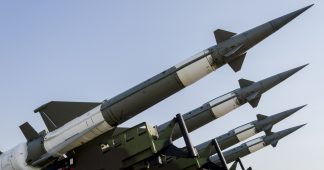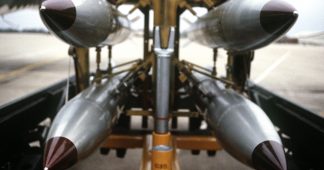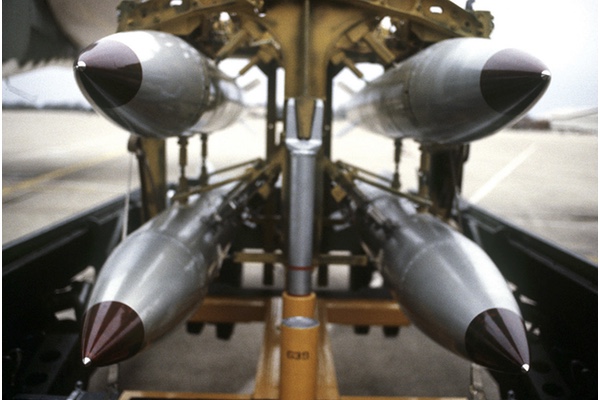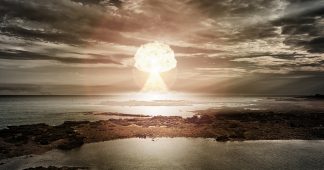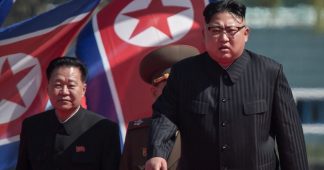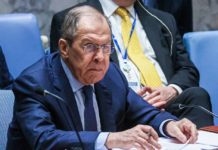“Signing Ceremony of the Treaty on the Prohibition of Nuclear Weapons
Presently, the entire world is hostage to a nuclear crisis expressed in the language of war and destruction by the leaders of North Korea and the United States We can look over the abyss and the reality of the consequence of the uses of nuclear weapons strikes fear and terror in the hearts of any sane person. There is no alternative to international coordinated diplomacy. We believe a broad perspective is valuable now to deal with this crisis and prevent others from arising in the future
In a speech, titled “Global Nuclear Disarmament A Practical Necessity, a Moral Imperative then United Nations,” High Representative Sergio Duarte reminded us that even before Hiroshima, on 11 June 1945, fifteen days before the UN Charter was signed, Manhattan Project scientists issued the “Franck Report, which stated with prescience: “Unless an effective international control of nuclear explosives is instituted, a race of nuclear armaments is certain to ensue following the first revelation of our possession of nuclear weapons to the world.” Appropriately, the first UN General Assembly resolution, focused on the elimination of nuclear weapons. Last week, a step was taken at the United Nations to fulfill that vision of a nuclear weapons free world.
Since September 20, 2017, 53 nations signed the Treaty on the Prohibition of Nuclear Weapons, popularly known as the Ban Treaty. It will enter into force after it is ratified by 50 states. UN Secretary General Guterres opened the signing of what he referred to as a “milestone” worthy of celebration.
The Treaty prohibits developing, testing, producing, manufacturing, possessing, stockpiling and deploying nuclear weapons, transferring or receiving them from others, using or threatening to use them, or allowing any stationing or deployment of nuclear weapons on national territories of signatories, and assisting, encouraging, or inducing any of these prohibited acts. The Treaty requires each signatory state to develop “legal, administrative and other measures, including the imposition of penal sanctions, to prevent and suppress” these prohibited activities.
Criticism has been made that the Treaty is not supported by the nine states with nuclear weapons. Critics from nuclear weapons states argue that the Treaty does not address the threat of North Korea, undermines the Nuclear Nonproliferation Treaty (NPT) and will not advance nuclear disarmament.
The Treaty exemplifies an effort to establish a universal formal legal prohibition to end the incoherence of the states with nuclear weapons asking others to do as we say, not as we do. Nothing stimulates nuclear proliferation so much as strong states and coalitions such as NATO claiming they need these weapons for their security while claiming they create dangers for the world when others have them. There are no good hands for such horrible arms. We agree with the Nobel Peace Laureates who joined former South Korean President and Nobel Laureate Kim Dae Jung and stated in the Gwanju Declaration of Nobel Peace Laureates:
If we are to have stability, we must have justice. This means the same rules apply to all. Where this principle is violated disaster is risked. In this regard we point to the failure of the nuclear weapons states to fulfill their bargain contained in the Nuclear Nonproliferation Treaty to negotiate the universal elimination of nuclear weapons. To pursue a nuclear-weapons-free Korean Peninsula or Middle East or South Asia, without credible commitment to universal nuclear disarmament is akin to a parent trying to persuade his teenagers not to smoke while puffing on a cigar.
There are steps available to make progress in this area and they include: a. Completing a treaty with full verification mechanisms cutting off further production of highly enriched uranium or plutonium for weapons purposes. b. Universal ratification of the Comprehensive Test Ban Treaty, now ratified by 176 nations. c. Taking the arsenals of Russia and the US off of hair trigger, launch on warning high alert. d. Legally confirmed pledges by all states with nuclear weapons never to use them first. e. Making cuts in the US and Russia’s arsenal irreversible and verifiable.
The NPT requires the US, China, Russia, UK, and France to negotiate the elimination of nuclear weapons. Each of these states are either modernizing their nuclear arsenals and/or expanding them rather than fulfilling their legal obligations to negotiate their elimination. It is time they began to fulfill their disarmament duties by either joining the Ban Treaty and addressing its limitations of verification and other technical issues or move forward in the arduous process of negotiating a comprehensive nuclear weapons convention to their liking. Sitting on the sidelines and offering no better way forward is inadequate.
The Treaty, in its preamble, highlights, “the ethical imperative” to achieve a nuclear weapons free world. The Treaty is designed, in its intent and substance, to stimulate, support, and advance humanity’s quest for the security of a nuclear free world. Obviously, more work is needed. Rather than only criticize that the Treaty does not do everything at once, critics should get to work on moving forward.
The Treaty states “that any use of nuclear weapons would be contrary to the rules of international law applicable in armed conflict, in particular international humanitarian law.” The Treaty deftly highlights prohibitions on the use of nuclear weapons that apply to all states now, including those with the weapons.
Existing international humanitarian law (law of war) limits the use of force in armed conflict, compels distinctions between civilians and combatants, sets forth requirements that force be proportionate to specific military objectives, prohibits weapons of a nature to that causes superfluous injury or unnecessary suffering and provides rules for the protection of the natural environment. The Treaty further emphasizes “that any use of nuclear weapons would also be abhorrent to the principles of humanity and the dictates of public conscience.”
The Treaty makes clear that even today should North Korea bomb Tokyo with a nuclear weapon, should a conflict take place, that it would be illegal and indeed criminal. This scope of the existing illegality of such uses of the weapon applies to all states, including those that have not signed on to the Treaty.
The Ban Treaty presents a challenge to the nuclear weapons states to help make humanity great by joining in efforts to eliminate nuclear weapons.
GSI was honored to participate in the Treaty negotiations along with the International Campaign to Abolish Nuclear Weapons and hundreds of other passionate civil society advocates who for decades have laid the groundwork for this step forward.
Respectfully,
Jonathan Granoff”
Comment from Wayne Hall:
Jonathan Granoff’s statement reflects what is pretty close to consensus in the “mainstream anti-nuclear-weapons movement”.
He acknowledges that “criticism has been made that the Treaty is not supported by the nine states with nuclear weapons”. But the only counter-argument he offers to this obvious point is the moral argument that “if we are to have stability, we must have justice. This means the same rules apply to all.” But there are not only moral but also also political considerations that should not be left out of the nuclear weapons debate, as they habitually are by the anti-nuclear movements. The requirement that “the same rules apply to all” (by order of the United Nations) will be resisted not only by people who actively believe in nuclear deterrence and the utility and desirability of nuclear weapons possession. They will also be resisted by “anti-globalist” champions of their own state’s sovereignty, irrespective of any views they might have on nuclear weapons. Moreover, the credibility of such requirements from the United Nations is undermined by the United Nations’ own record. Following the EU and NATO, the United Nations does not convincingly demand that “the same rules apply to all” if the question is e.g. whether Nazis have a right to participate in politics. In Ukraine they do. In Germany they do not. To challenge this double standard is to run the risk of being branded “pro-Putin”. Many other such examples could be given of this lack of impartiality, justifying “conspiracy theorists'” Manichean conceptions of the United Nations and its role.
Moreover, a statement such as “the entire world is hostage to a nuclear crisis expressed in the language of war and destruction by the leaders of North Korea and the United States” is not an example of “applying the same rules to all” because it totally ignores the details of the way the deadlock between the US and North Korea over nuclear weapons has developed, including the relative willingness of the two sides to try to find a solution, prior to the deadlock being set in stone.
In this context, Mikael Book’s introduction of Altiero Spinelli (“The United States must be prepared to disengage itself militarily and to accept the denuclearisation of Europe”) into DiEM25’s Draft Nuclear Weapons policy statement is a welcome innovation. It greatly assists with generation of the dynamic that is needed to commence movement towards nuclear disarmament, potentially bypassing the built in paralysis of the “globalist” United-Nations-centred approach to nuclear disarmament. It proposes something that can be discussed and decided by the European Union, unilaterally (i.e. autonomously and freely). Like the Swedish nuclear disarmament of the 1960s.
